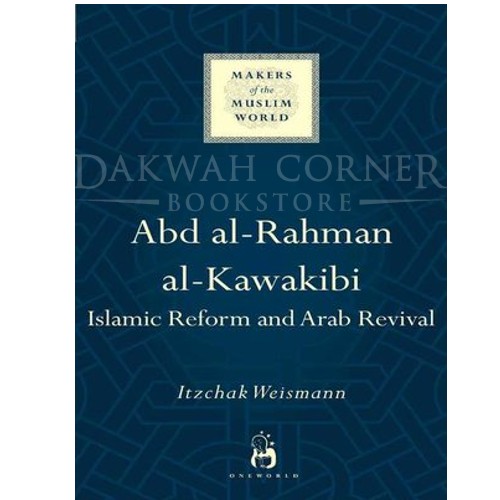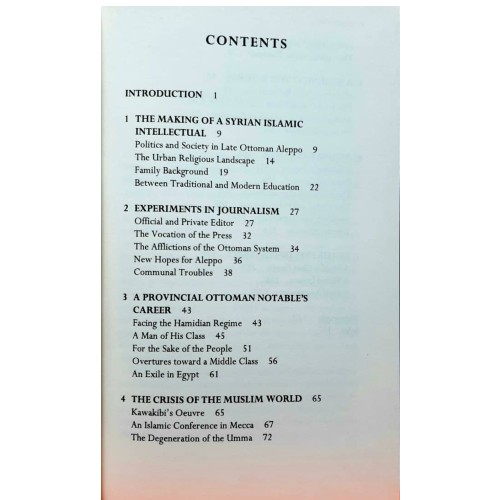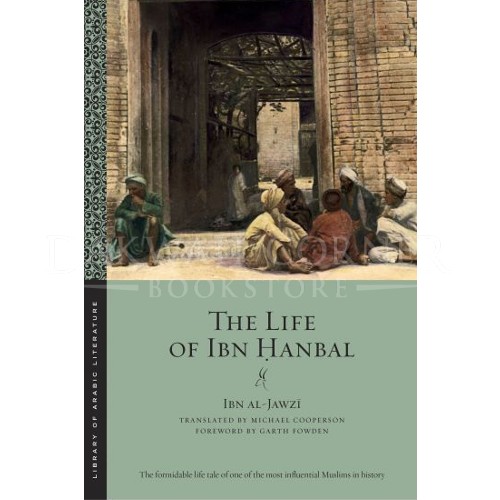| Weight | 0.65 kg |
|---|---|
| Dimensions | 22 × 15 × 2 cm |
| Author | |
| Binding | Hardcover |
| ISBN | 9781786076854 |
| Pages | 125 |
| Publisher | One World Academic / Times Distribution |
Makers of the Muslim World: ‘Abd al-Rahman b ‘Amr al- Awza’i
RM155.00
Abd al-Rahman b. ‘Amr al-Awza’i (c.707–774) was Umayyad Syria’s most influential jurist, part of a generation of scholars who began establishing the first formal structures for the preservation and dissemination of religious knowledge. Following the Abbasid revolution, they provided a point of stability in otherwise unstable times.
Despite his close ties to the old regime, al-Awza’i continued to participate in legal and theological matters in the Abbasid era. Although his immediate impact would prove short-lived, his influence on aspects of Islamic law, particularly the laws of war, endures to this day.
Frequently Bought Together
Be the first to review “Makers of the Muslim World: ‘Abd al-Rahman b ‘Amr al- Awza’i” Cancel reply
You must be logged in to post a review.
You may also like…
Atlas: Abu Bakr As-Siddiq
This book Atlas Abu Bakr As-Siddiq provides detailed and insightful glimpses into the extraordinary life of the first Caliph of the Muslims, Abu Bakr As-Siddeeq (May Allah be pleased with him), and his massive contribution to all of humanity. As a principled and disciplined young person in Makkah; a successful businessman; embracing Islam under the tutelage of the Prophet (Peace and Blessings of Allah be upon him) and laying the groundwork for Islam`s spread across the globe. In a world currently needing moral and ethical leadership based on the divine revelations of Allah, the life of Abu Bakr (May Allah be pleased with him) offers a blueprint to a successful life to those Muslims, and non-Muslims, searching for the truth. He was truly a man for all ages, encompassing all aspects of a complete individual, as an intellectual, Companion of the Prophet (Peace and Blessings of Allah be upon him) and Caliph.
Makers of the Muslim World: Al Ma’mun The Revival of Islam
This accessible biography treats al-Ma’mum (786-833) as the product of his age, which was a formative period in the development of Islamic law and theology. It presents him in his many facets: rebel, rationalist, scientist, poet, politician, warrior, inquisitor, and self-proclaimed defender of the faith. Drawing on contemporary sources, some friendly and others hostile, it offers a comprehensive portrait of a fascinating figure in Islamic history.
Makers of the Muslim World: Ibn Taymiyya
Ibn Taymiyya (1263–1328) of Damascus was one of the most prominent and controversial religious scholars of medieval Islam. He called for jihad against the Mongol invaders of Syria, appealed to the foundational sources of Islam for reform, and battled against religious innovation. Today, he inspires such diverse movements as Global Salafism, Islamic revivalism and modernism, and violent jihadism. This volume synthesizes the latest research, discusses many little-known aspects of Ibn Taymiyya’s thought, and highlights the religious utilitarianism that pervades his activism, ethics, and theology.
Hadith: Muhammad’s Legacy in the Medieval and Modern World (2nd Edition)
Contrary to popular opinion, the bulk of Islamic law does not come from the Quran but from hadith, first-hand reports of the Prophet Muhammad’s words and deeds, passed from generation to generation. However, with varying accounts often only committed to paper a century after the death of Muhammad, Islamic scholars, past and present, have been faced with complex questions of historical authenticity. In this wide-ranging introduction, Jonathan A. C. Brown explores the collection and criticism of hadith, and the controversy surrounding its role in modern Islam. This edition, revised and updated with additional case studies and attention to the very latest scholarship, also features a new chapter on how hadiths have been used politically, both historically and in the Arab Spring and its aftermath. Informative and accessible, it is perfectly suited to students, scholars and general readers interested in this critical element of Islam.
Related Products
The Muqaddimah: An Introduction To History
The Muqaddimah: An Introduction to History –Abridged Edition
Disagreements of The Jurists: A Manual of Islamic Legal Theory
“This book will be useful especially to those who are interested in the history of law and… the history of the Fatimids.”
The Zion Deception
With a keen sense of closure and awareness of the interconnectedness behind history’s failings, author Dr. Laurence B. Brown exposes popularized fallacies, and reveals the threat Zionism poses not only to Jews, but to the world as a whole.
Muhammad: Prophet for Our Time (Harper Perennial)
Muhammad was born in 570 CE, and over the following sixty years built a thriving spiritual community, laying the foundations of a religion that changed the course of world history.
Holy War: The Crusades And Their Impact On Today’s World
Karen Armstrong, the bestselling author of A History of God, enters the minds of kings and sultans, popes, saints, assassins, and simple pilgrims, skillfully presenting the Crusades from the perspective of all three traditions and with a view toward their profound and continuing influence.
The Epistle On Legal Theory: A Translation of Al-Shafii’s Risalah
The Epistle on Legal Theory is the oldest surviving Arabic work on Islamic legal theory and the foundational document of Islamic jurisprudence. Its author, Muhammad ibn Idris al-Shafi’i (d. 204/820), was the eponym of the Shafi’i school of legal thought, one of the four rites in Sunni Islam. This fascinating work offers the first systematic treatment in Arabic of key issues in Islamic legal thought. These include a survey of the importance of Arabic as the language of revelation, principles of textual interpretation to be applied to the Qur’an and prophetic Traditions, techniques for harmonizing apparently contradictory precedents, legal epistemology, rules of inference, and discussions of when legal interpretation is required. The author illustrates his theoretical claims with numerous examples drawn from nearly all areas of Islamic law, including ritual law, commercial law, tort law, and criminal law. The text thus provides an important window into both Islamic law and legal thought in particular and early Islamic intellectual history in general .
This new translation by a leading scholar of al-Shafi’i and his thought makes available in lucid, modern English one of the earliest complete works on Islamic law—one that is centrally important for the formation of Islamic legal thought and the Islamic legal tradition.
Road Blocks (P/B)
“Whether you call yourself an activist, an Islamic worker, a community volunteer, or a caller to God, working for Islam is one of the most worthy occupations in this life. It is also a challenging path, with many roadblocks lying in wait…”
Alternative Sociologies Of Religion: Through Non-Western Eyes
Sociology has long used Western Christianity as a model for all religious life. As a result, the field has tended to highlight aspects of religion that Christians find important, such as religious beliefs and formal organizations, while paying less attention to other elements. Rather than simply criticizing such limitations, James V. Spickard imagines what the sociology of religion would look like had it arisen in three non-Western societies. What aspects of religion would scholars see more clearly if they had been raised in Confucian China? What could they learn about religion from Ibn Khaldun, the famed 14th century Arab scholar? What would they better understand, had they been born Navajo, whose traditional religion certainly does not revolve around beliefs and organizations?
Through these thought experiments, Spickard shows how non-Western ideas understand some aspects of religions―even of Western religions―better than does standard sociology. The volume shows how non-Western frameworks can shed new light on several different dimensions of religious life, including the question of who maintains religious communities, the relationships between religion and ethnicity as sources of social ties, and the role of embodied experience in religious rituals. These approaches reveal central aspects of contemporary religions that the dominant way of doing sociology fails to notice. Each approach also provides investigators with new theoretical resources to guide them deeper into their subjects. The volume makes a compelling case for adopting a global perspective in the social sciences.
Finding Truth: 5 Principles for Unmasking Atheism, Secularism, and Other God Substitutes
“If I’d read this book as a young man, I would have been challenged to re-examine my views much earlier.”
– J. Warner Wallace
















































There are no reviews yet.